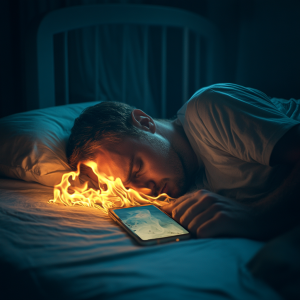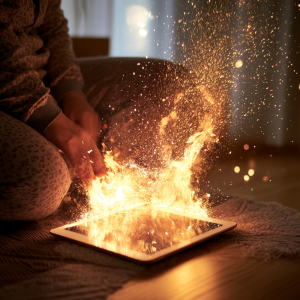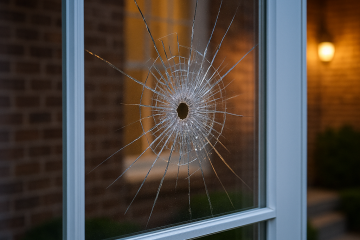
cell phone catching fire in bed
Why Your Phone and Laptop Are the Bedtime Roommates You Don’t Want
Let’s get real: the gadgets you adore—your trusty phone, your ever-reliable laptop—might be the worst bedtime companions ever. Sure, they keep you connected, entertained, and even lull you to sleep, but they also come with a fiery side. Literally.
Lithium-ion batteries, the magic behind your devices, are increasingly responsible for dangerous fires and explosions. On airplanes alone, there have been 579 reported incidents since 2006. That’s right—just in the controlled, highly monitored environment of the sky, where cabin crews are trained to respond. Imagine what could happen in your bedroom, where the only first responder might be a groggy you fumbling for a fire extinguisher.
Why Bedtime Electronics Are a Bad Idea
If you’re sleeping with your phone under your pillow or your laptop lounging on your comforter, you’re playing with fire. And I don’t mean metaphorically. Lithium batteries don’t just overheat—they can combust, releasing toxic gases, shooting flaming debris, and causing fires that are incredibly hard to extinguish.
Let’s break it down:
1. Thermal Runaway: When a lithium battery overheats, it can set off a chain reaction. One cell fails, causing the next one to fail, and so on. This process creates heat, toxic fumes, and fire.
2. Hard to Extinguish: These fires aren’t your standard flames. A fire extinguisher? It might not work. You’ll need thousands of gallons of water or special equipment to truly put it out. Most of us aren’t sleeping with a pool and a fire crew on standby.
The Nighttime Danger of Lithium Batteries: Vicious and Close
Chief Fire Marshal Daniel Flynn from New York City pulled no punches when he testified before Congress about lithium battery fires. He described them as “more intense and more dangerous” than other types of fires. These aren’t your run-of-the-mill kitchen grease fires—they’re explosions waiting to happen.
“When these batteries overheat,” Flynn explained, “they undergo a series of explosions, releasing highly toxic gases and projecting flaming cells that can travel great distances.” And here’s the terrifying part: these fires are often right next to us when they ignite. Whether it’s a phone under your pillow or a laptop on your bed, these incidents happen in our most intimate spaces—where escape can be hardest, especially at night.
Flynn emphasized that these fires instantly create severely dangerous conditions. Toxic smoke fills the air, the fire spreads rapidly, and the confined space of a bedroom can turn into a trap. “This is especially true if a fire occurs at night, when an occupant is sleeping,” he warned.

Laptop catches on fire due to lithium battery explosion
The Lithium Battery Explosion Numbers Tell a Fiery Story
While aviation is tightly regulated, lithium battery fires still wreak havoc. Of the 579 incidents on planes between 2006 and 2024:
229 involved battery packs or standalone batteries.
122 were caused by e-cigarettes or vape devices.
81 involved cell phones.
70 incidents stemmed from laptops.
In one aviation case, a laptop overheated mid-flight in the lavatory, setting off a smoke detector. The crew had to stow it in a thermal containment bag—a special fireproof sack designed for such emergencies. On the ground, another flight was delayed after a passenger’s carry-on bag ignited during boarding, forcing an evacuation.
Now, think about this: if these incidents happen in airplanes, with safety protocols in place and trained professionals on hand, what might happen in your bed with no one watching?
And this doesn’t even cover the countless fires reported in homes, cars, and workplaces.
Here are some more statistics to consider:
- Consumer Product Safety Commission (CPSC) Data: Between 2017 and 2022, the CPSC recorded over 25,000 incidents of fire or overheating involving lithium-ion batteries, leading to an estimated 13 deaths and 141 injuries.
- National Fire Protection Association (NFPA) Findings: The NFPA observed a 131% increase in fires involving e-bikes and e-scooters between 2019 and 2021, with many incidents linked to lithium-ion batteries.
- London Fire Brigade (LFB) Statistics: In 2024, the LFB reported approximately 160 fires caused by e-bike and e-scooter batteries, averaging about one fire every other day.
- Allianz Insurance Claims: Allianz noted that fire-related claims involving lithium batteries have more than doubled in the past year, with the average damage exceeding £50,000.
How to Protect Your Home (and Yourself) from Lithium Battery Explosions
The good news is, you can drastically reduce the risks by making a few smart changes:
1. Evict Devices from Bed: Keep electronics off your bed and away from flammable materials like blankets and pillows. Place them on a solid, heat-resistant surface like a nightstand.
2. Unplug Overnight: Overcharging is a major fire risk. Unplug your devices once they’re fully charged—better yet, charge them earlier in the day.
3. Invest in Safety: Use quality chargers and accessories. Cheap, off-brand chargers can overheat your devices and increase the fire risk.
4. Consider Thermal Safety Gear: If you’re extra cautious, invest in a thermal containment bag. These can contain a fire if your device overheats.
5. Invest in a fire blanket to help you put out any fires. Keep one in your kitchen and where you commonly store your devices.
5. Stay Aware: If a device feels unusually hot, unplug it immediately and let it cool down. Don’t ignore any strange smells or smoke—those are your red flags.

Ipads catch on fire as well.
Why It Matters
Living a self-reliant lifestyle is about anticipating risks and taking action before disaster strikes. Fires from lithium batteries are growing more common, more intense, and harder to manage. The numbers from aviation alone should be a wake-up call for all of us.
Tonight, when you’re tempted to doze off with your phone glowing softly under your pillow, ask yourself: is it worth risking your home, your safety, and your peace of mind? Let’s keep the fires where they belong—in the fireplace, not your bedroom.
So banish the gadgets to their proper places, sleep soundly, and enjoy the security that comes with being prepared.
P.S. This article should also make it clear that you shouldn’t store extra lithium batteries amongst other items. Store them in a fire safe pouch instead.


